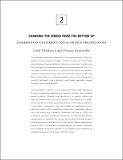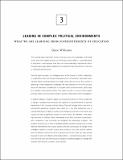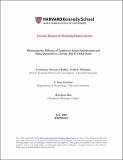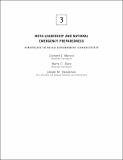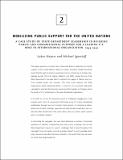Browsing The Big Data Problem by Title
Now showing items 3-22 of 46
-
Beyond Katrina: Improving Disaster Response Capabilities
(Center for Public Leadership, 2006-01-02)As Hurricanes Katrina, Rita, and Wilma successively lashed the Gulf Coast starting in late August 2005, nature’s fury exposed serious weaknesses in the United States’s emergency response capabilities. These problems were ... -
Building Effective Intra-Organizational Networks: The Role of Teams
(Center for Public Leadership, 2003)This paper integrates the largely independent literatures on networks and teams. Our objective is twofold: (1) To understand what constitutes an effective organizational network when much of the work of the organization ... -
Changing the World from the Bottom Up: Leadership in Grassroots Social-Change Organizations
(Center for Public Leadership, 2004-01-02)The challenges of leadership in grassroots social-change organizations (SCOs) are daunting: the task is large, but funding is limited and uneven, and there is often a tension between financial stability and mission ... -
Coexistence in Israel: A National Study
(Center for Public Leadership, 2008-05-15)This national study was conducted in an effort to directly examine the relations between Israel’s Jewish and Arab citizens. According to Israel’s 2007 census, the country has a Jewish majority of almost 80 percent and an ... -
Contemporary Public Leadership In China: A Research Review and Consideration
(Center for Public Leadership, 2005-01-07)Background China’s economic and political importance has captured the world’s attention. China has become increasingly integrated into the global economy. Between 2000 and 2003, it accounted for one-third of global economic ... -
Effectiveness In Civic Associations: Leader Development, Member Engagement And Public Influence In The Sierra Club
(Center for Public Leadership, 2005-01-08)For much of our history, civic associations have served as schools of democracy for the millions of Americans to whom they taught leadership skills, democratic governance and public engagement. Civic associations rooted ... -
An Examination Of Trust In Contemporary American Society
(Center for Public Leadership, 2006-01-01)It is hard to imagine a society functioning in the absence of trust. From the smallest incident—crossing the street when the light is green—to the most consequential events—a government fulfilling its pledge to pay Social ... -
Formal and Informal Discrimination Against Women At Work: The Role of Gender Stereotypes
(Center for Public Leadership, 2005-01-02)When asked to think about a hostile environment for women in the workplace, many of us would first envision overt instances of sexual harassment or blatant employment discrimination. These associations are certainly not ... -
How Individual Power Use Affects Team Process and Performance: Implications for the Powerholder
(Center for Public Leadership, 2006-01-06)Even within teams of peers, certain individuals have more power than others. Individual members may have essential skills and experience, networks outside the team, or status within the organization that give them more ... -
The Iceberg and the Titanic: Electoral Defeat, Policy Moods, and Party Change
(Center for Public Leadership, 2003-01-01)Multiple factors can be offered to explain the Labour victory and Conservative defeat in the 2001 British general election. Here we pursue one of the most interesting explanations offered by a modified Downsian model of ... -
Knowledge Nomads: Understanding an Overlooked Segment of the Workforce Helps Managers Lead
(Center for Public Leadership, 2006-01-08)Managers have formal and official supervisory authority within an organizational hierarchy. As a result, a perennial concern of managers is employee mobility, i.e., the turnover of workers, and the implication of worker ... -
Leader Authenticity Markers: Findings From A Study of African-American Leaders
(Center for Public Leadership, 2004-01-06)Authenticity has become a central concept in leadership studies, but the question of how followers assess the authenticity of their political leaders has not been addressed. With few exceptions, the literature on ... -
Leading in Complex Political Environments: What We Are Learning from Superintendents of Education
(Center for Public Leadership, 2004-01-03)This working paper examines some of the key issues and challenges confronting some of the most significant actors in American political affairs—superintendents of education—and explores how they can drive meaningful ... -
Learning To Be Civic: Higher Education and Student Life, 1890-1940
(Center for Public Leadership, 2004-01-09)All studies of American civic life identify the years between 1890 and 1940 as the high tide of civic engagement: the period in which voluntary associations and other formal organizations, for profit and nonprofit, ... -
Legitimacy In A Bastard Kingdom
(Center for Public Leadership, 2004-01-05)"Now, gods, stand up for bastards!" No, this is not the prayer of the New York litigator; it is the battle cry of Edmund, bastard son of the Earl of Gloucester and one of the great early modern theorists of political ... -
Management as a Profession
(Center for Public Leadership, 2004-01-01) -
Measuring the Efficacy of Leaders to Assess Information and Make Decisions in a Crisis: The C-LEAD Scale
(Center for Public Leadership, 2009-07-01)Based on literature and expert interviews, we developed the Crisis Leader Efficacy in Assessing and Deciding scale (C-LEAD) to capture the efficacy of leaders to assess information and make decisions in a public health and ... -
Meta-Leadership and National Emergency Preparedness: Strategies to Build Government Connectivity
(Center for Public Leadership, 2005-01-03)The acute threat of internationally driven and homeland-directed terrorism has changed the rules and expectations for governmental action, interaction, and willpower. Unprecedented coordination of resources, information, ... -
Mobilizing Public Support for the United Nations
(Center for Public Leadership, 2003)This paper examines a critical case of Executive Branch leadership during the creation of the United Nations. Before his death, President Franklin Roosevelt hoped that the wartime alliance would become the cornerstone of ... -
Narcissism And Leadership: A Review And Research Agenda
(Center for Public Leadership, 2006-01-04)It is clear that a significant number of world leaders have rigidly grandiose belief systems and leadership styles. Often, the authors who recount the “psychohistories” of these leaders connect both the leaders’ assent ...



